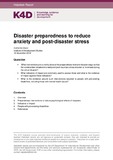| dc.contributor.author | Grant, Catherine | |
| dc.date.accessioned | 2019-01-11T10:51:19Z | |
| dc.date.available | 2019-01-11T10:51:19Z | |
| dc.date.issued | 2018-11-16 | |
| dc.identifier.citation | Grant, C. (2018). Disaster preparedness to reduce anxiety and post-disaster stress. K4D Helpdesk Report. Brighton, UK: Institute of Development Studies | en |
| dc.identifier.uri | https://opendocs.ids.ac.uk/opendocs/handle/20.500.12413/14267 | |
| dc.description.abstract | This report focuses on disaster mental health preparedness, which is a significant reduction method to protect individuals from detrimental psychological effects arising from disasters. Disasters are stressful events not only for individuals who suffer from personal loss but also for the community at large (Khankeh et al., 2011). During the past two decades, natural hazards have affected more than 3 million families around the world (Roudini et al., 2017). The research of Clay et al. (2014) demonstrated a positive connection between disaster preparedness and mental health, and probability of a mental disorder following disasters is due to an absence of preparedness. Disaster mental health preparedness is focused on in the literature and there are many examples of this. The first section of this report focuses specifically on disaster mental health preparedness. The second section focuses on the available evidence looking at the impact of interventions. The literature suggests that more research and evaluation is required to evaluate the efficiency and effectiveness of mental health interventions to reduce the impact of disasters. Mental health experts have limitations, especially in relation to insufficient knowledge, and practices concerning mental health preparedness. The third section looks at people with pre-existing disabilities, including mental health conditions. People with disabilities suffer disproportionately and are at greater risk of suffering decreased mental health during disasters, which could perpetuate a cycle of poverty and isolation that is heightened during disasters (IASC, 2007). | en |
| dc.language.iso | en | en |
| dc.publisher | IDS | en |
| dc.relation.ispartofseries | K4D Helpdesk Report;501 | |
| dc.rights.uri | https://www.nationalarchives.gov.uk/doc/open-government-licence/version/3/ | en |
| dc.subject | Health | en |
| dc.subject | Rights | en |
| dc.subject | Social Protection | en |
| dc.title | Disaster Preparedness to Reduce Anxiety and Post-Disaster Stress | en |
| dc.type | Helpdesk | en |
| dc.rights.holder | © DFID - Crown copyright 2018. | en |
| dcterms.dateAccepted | 2018-11-16 | |
| rioxxterms.funder | Department for International Development, UK Government | en |
| rioxxterms.identifier.project | K4D | en |
| rioxxterms.version | VoR | en |
| rioxxterms.funder.project | 238a9fa4-fe4a-4380-996b-995f33607ba0 | en |

